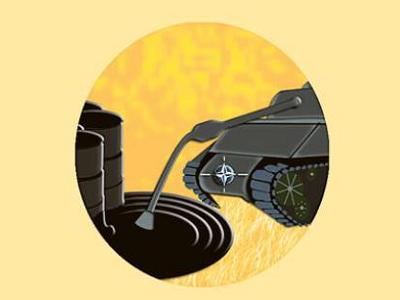Libyans Must Fully Liberate Themselves

(Image Credit: Hazem Alhabbal/Gulf News)
By Ramzy Baroud, Special to Gulf News
Now that Gaddafi and his sons are on the run, western allies are speaking of an orderly transition, nation-building, and direct intervention in managing post-Gaddafi Libyan affairs.
It is understood that the ousting of Muammar Gaddafi and his contemptible regime was a ‘regime change from the air’, orchestrated by Nato at a most opportune time.
Now that Gaddafi and his sons are on the run, western allies are speaking of an orderly transition, nation-building, and direct intervention in managing post-Gaddafi Libyan affairs. Many commentators warn to not repeat mistakes committed in Afghanistan and Iraq.
The mere insinuation of such parallels demonstrates the true intentions that western powers have had towards Libya from the start, when they deceitfully interpreted UN Resolution 1973 (meant to protect Libyan civilians from the murderous acts of their government) to connote regime change.
The resolution “has since been used as Nato’s fig leaf to justify the onslaught against Gaddafi and deliver regime change from the air,” wrote Seumas Milne in the Guardian (August 24), under the title: ‘Libya’s imperial hijacking is a threat to the Arab revolution’.
Some of us have repeatedly warned that Nato’s intervention in the Libyan uprising was an underhand attempt at seizing the popular initiative of the Libyan people, and to deny a rich Arab nation the opportunity of charting the course of its own future, fully independent from both Arab dictators and Western diktats.
But the relatively easy manner in which Gaddafi’s supposedly 76,000 strong armed forces, people’s militias and other armed units were defeated may inspire a rethink in direct western military intervention, which was widely discredited after their costly and bungled wars in Afghanistan and Iraq.
Many mainstream commentators (and surely officials) are back to the drawing board, comparing Libya to past military conquests, gleaning lessons, underlying mistakes and highlighting supposedly successful strategies.
John F. Burns, writing in the New York Times (August 22), discussed some of the seemingly eerie similarities between post-Gaddafi Libya and post-Saddam Iraq. In an article titled ‘Parallels Between Qaddafi [Gaddafi] and Hussein [Hussain] Raise Anxiety for Western Leaders’, Burns wrote: “The list (of parallels between both experiences) sounded like a rule book built on the mistakes critics have identified as central to the American experience in Iraq.”
Of course, from a Libyan and Arab perspective the situation in Libya is by no means similar to that in Afghanistan (2001) or Iraq (2003). The latter military adventures were instigated by the US and its allies, who manipulated ethnic, sectarian and tribal divides within these nations to dismantle, weaken and destroy any possibility at resistance to the imperial project that aimed solely at achieving geo-economic hegemony.
The Libyan situation is hardly comparable. The popular revolt last February was a genuine uprising instigated by four decades of injustice and brutality, and happened at a time when Gaddafi was being reintroduced — by the very Nato that bombed his compound and killed some of his family members — as a rehabilitated statesman. Gaddafi’s renouncement of weapons of mass destruction in 2003 was sold to the public as the key to US and European turnabout of attitude towards the once vile leader. The truth of course, can be found amid the most lucrative oil and gas contracts that Libya signed with key European countries, and Gaddafi’s abandonment of the once hostile pan-Arab attitude towards western imperialism.
Since 2003, Gaddafi remained unchanged. Libyans continued to subsist in a most harsh reality as the ‘King of Kings of Africa’ squandered the countries resources on his family, to forge ineffective new alliances and other worthless matters.
Trapped between western backing of Gaddafi, and the latter’s brutality and absurd sense of self-importance, and also inspired by a poor Tunisian vegetable vendor who tragically set himself ablaze, thereby igniting a revolution in his own country, Libyans revolted. Their revolt was an incredible blending of despair and hope.
Their slogan was that of ‘victory or death’. More, the fact that the Libyan revolution was shouldered by two successful revolutions, Tunisia in the east, and Egypt in the west, it also ushered in the return of Libya to the Arab fold after years of abandonment — a calculated decision made by Gaddafi himself.
Libya is not Iraq, and is certainly not Afghanistan. Alas, many Nato countries insist on seeing it that way, simply because they intervened for specific reasons, all self-serving and none truly concerned with freedom and democracy.
Libya’s National Transitional Council (NTC) is surely aware of the price expected of them in exchange for Nato’s not-so-benevolent act, without which Gaddafi cannot possibly be a wanted man with a $1.7 million price on his head. NTC “representatives met quietly in Dubai with officials from the US, UK, Canada, Italy …, to map out detailed transition plans,” reported the Wall Street Journal on August 23. The ‘detailed transition’ will surely try to avoid the mistakes of Afghanistan and Iraq, as many officials and commentators astutely recommended. While the US is yet to offer to rebuild Libya (simply because it cannot afford it), Nato seems giddy to get involved in charting the course of the ‘new Libya’, with France leading the way on that front.
It might not be long before Nato’s victory in Libya becomes a political-military doctrine in its own right. US President Barack Obama, and other Western leaders are already offering clues regarding the nature of that doctrine. In a statement issued August 22 from Martha’s Vineyard, where Obama is vacationing, the US president said: “Nato has once more proven that it is the most capable alliance in the world and that its strength comes from both its firepower and the power of our democratic ideals.” It’s difficult to underline with any certainty how the gung-ho mentality coupled with democracy rhetoric was any different from George W. Bush’s justification of his country’s invasion of Afghanistan and Iraq.
Jonathan Steele, writing in the Guardian (August 22), described the Tripoli showdown as “an almost exact repetition of the way US aircraft and missiles enabled the Northern Alliance warlords to capture Kabul from the Taliban a decade ago.”
Even if the NTC accepts such a dismal role for itself as a pawn in Nato’s failing great game in the Middle East and North Africa, it is unlikely that the Libyan people will tolerate any possible political subservience to Gaddafi’s old allies. A nation that has freed itself from one depraved dictator cannot allow itself to fall victim once more.
– Ramzy Baroud is the editor of PalestineChronicle.com. He taught Mass Communication at Australia’s Curtin University of Technology. His latest book is My Father Was a Freedom Fighter: Gaza’s Untold Story.










































0 Comments